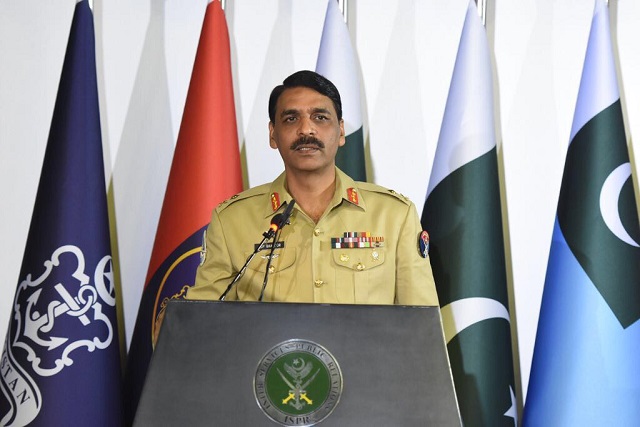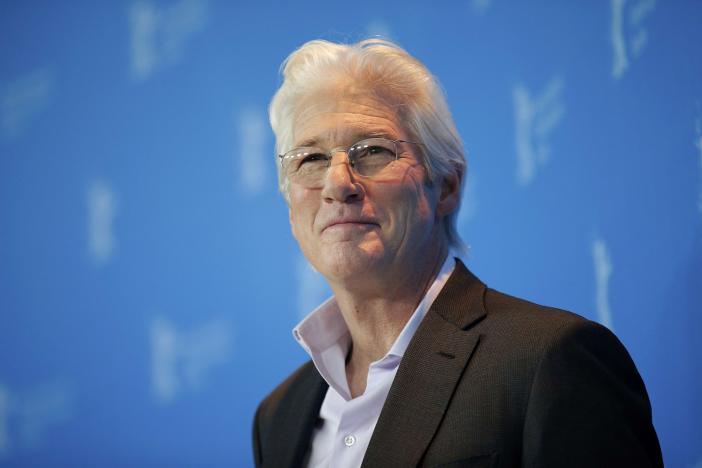
Speaking at a news conference in Rawalpindi, the chief military spokesperson insisted that army chief General Qamar Javed Bajwa’s recent interaction with a group of journalists was taken out of context.
A few weeks back, the army chief had an off the record interaction with some journalists at the General Headquarters (GHQ) in Rawalpindi.
The information leaked after the three-hour-long meeting gave a rare insight into Gen Qamar’s ideas on issues ranging from security to politics and from the current role of the judiciary to the reservations of the army on the 18th Constitutional Amendment.
Some of the journalists at the meeting later coined the term ‘Bajwa Doctrine’, which raised many eyebrows.
Inter-Services Public Relations (ISPR) chief Major Gen Asif Ghafoor has now rejected the impression that ‘the Bajwa Doctrine’ has anything to do with political issues such as the 18th Amendment or the judiciary.
All terrorist sanctuaries including Haqqani network eliminated, says DG ISPR
“If there exists any [such] doctrine...it is only related to the security of Pakistan,” Ghafoor said, adding that some media persons, invited to the interaction, had wrongly linked the army chief’s entire conversation with the ‘Bajwa Doctrine’.
He said the army chief’s doctrine should only be seen through the security lens. “Like his predecessors, Gen Qamar has a ‘doctrine’ but that is to bring back peace in Pakistan that existed before 9/11 or the Afghan War,” Ghafoor said.
The ISPR DG also dismissed reports that Gen Qamar had held any secret meetings with Punjab Chief Minister Shehbaz Sharif. He did, however, confirm that Shehbaz telephoned the army chief.
“The purpose of the CM’s telephone call was to offer financial assistance to the army chief for the ongoing fencing along the Pakistan-Afghanistan border,” he said.
The army’s chief spokesperson also dismissed reports that the army was involved in the so-called National Reconciliation Ordinance (NRO) type deal.
Deposed premier Nawaz Sharif’s recent statement about talks with state institutions had sparked rumours about his possible deal with the establishment to get a bailout in a slew of graft cases he and his family are facing.
The Pakistan Tehreek-e-Insaf (PTI) on Tuesday also expressed concern over ‘the efforts’ to get Sharif out of the country and said it would not accept an NRO for Nawaz Sharif or his family members.
“These issues are not in army’s domain,” the ISPR chief said, adding that since 2018 is the election year, so there will be a lot of political activities. “Pakistan can only progress and prosper when all institutions stay in their domain and play their role accordingly,” he added.
He also refused to comment on the recent meeting between Prime Minister Shahid Khaqan Abbasi and Chief Justice Mian Saqib Nisar as well as the government’s move to appoint Ali Jahangir Siddiqui as envoy to the US despite his facing a graft inquiry.
Early and dignified return of Afghan refugees essential: DG ISPR Asif Ghafoor
“India should thank Pakistan”
On Pakistan’s role in fighting the menace of terrorism, the ISPR chief said the world must recognise the country’s efforts and sacrifices. “Had Pakistan not acted against the terror threat, it would have had spillover impact on India. Therefore, India should be thankful to Pakistan,” Ghafoor stressed
He said powerful countries including the US must view this part of the region through the geo-economic lens and not through geopolitics. While acknowledging hiccups in ties between the two countries, he said the US recently did take certain actions on the Afghan side of the border to address Pakistan’s concerns.
Pashtun Tahaffuz Movement
The spokesperson also spoke of the ongoing Pashtun Tahaffuz Movement launched by Manzoor Pishteen against the alleged highhandedness of security agencies in the tribal areas.
Ghafoor said he personally met Pishteen and all of his demands have already been accepted. He, however, defended the security measures including check posts in the tribal areas, saying those steps are necessary to deal with the terror threat.
He said such security checks would be done away with once the threat was eliminated completely.
Radd-ul-Fasaad
In his opening statement, Ghafoor gave an overview of the current security environment. He said successful holding of the Pakistan Super League (PSL) matches and 23rd March parade showed that Pakistan is marching towards peace and stability.
About operation Radd-ul-Fasaad, the DG ISPR said since its launch in February 2017, the operation has destroyed 26 terror networks.
“23,380 intelligence-based operations (IBOs) have been conducted in which 23,964 weapons have been recovered. 7,758 check posts have been installed in multiple areas,” he added.
He went on to laud the country’s intelligence agencies, claiming that they are the brains and eyes behind peace being upheld in the country. He said during the last 10-15 years, intelligence has played a key role in curbing terrorism.
He went on to list the seven major terrorist networks that have been eliminated from the country. These include the Jamaatul Ahrar Khurram Chapter, the Tehreek-e-Taliban Pakistan (TTP) Swabi and Lahore, the Inteqam-e-Waziristan and the Ansarul Sharia and the Tehreek-e-Taliban Swat (TTS) Dir.
CPEC and economy
General Ghafoor also spoke about the China Pakistan Economic Corridor (CPEC), stating the project should not be looked at through a political lens.
"We are embarking on CPEC with China, the power contestation in the region looks at CPEC as a geo-political faction of Pakistan and China," he stated.
He also said that CPEC will benefit the entire region and that is what Pakistan wants. "We are going ahead with CPEC in any case, the only thing others can try to do is create hurdles."
The military spokesperson also pressed on the need for Pakistan's economy to improve, adding that the country's economy suffered from the ongoing war on terror. "We have to take Pakistan towards stability for which economic activity is needed."
The 2018 Karachi
"Today's Karachi is much better than the Karachi of 2013, and this was observed during the PSL final on Sunday," he said, "PSL is an indicator of how peace is returning to Karachi."
He said there were 17 no-go areas in the city in 2013, but there are none as of now. "Shutter down strikes in the city have completely stopped," he added. There have been 386 political events in the city including sit-ins, protests and rallies, but none of them resorted to violence, he added. These are indicators of a good emerging economy, he added while referring to 100 per cent hotel occupancy in the city.
However, he said, this doesn't mean Karachi's been taken care of, much work is required.
[WITH ADDITIONAL INPUT FROM NEWS DESK]

1732271743-0/diddy-(45)1732271743-0-165x106.webp)



1732270499-0/Express-Tribune-(7)1732270499-0-270x192.webp)
1732267715-0/BeFunk_§_]__-(32)1732267715-0.jpg)

1732263788-0/BeFunk_§_]__-(30)1732263788-0.jpg)
1732268955-0/BeFunk_§_]__-(33)1732268955-0.jpg)







COMMENTS (1)
Comments are moderated and generally will be posted if they are on-topic and not abusive.
For more information, please see our Comments FAQ